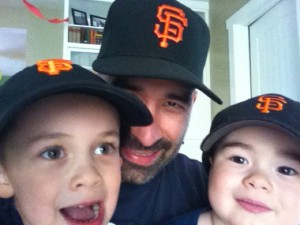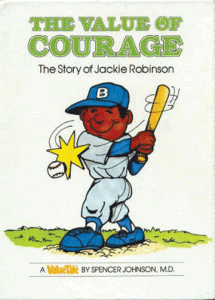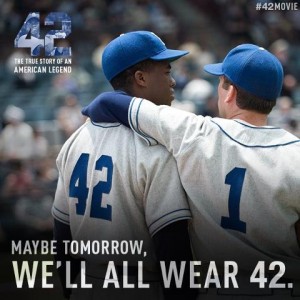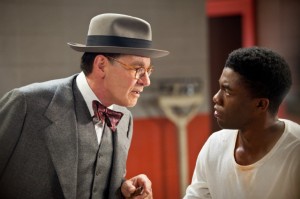By Paul Barker (also published at RationalFaiths.com)
Born and raised in Northern California, Paul received his education at Ricks College and BYU with a BA in Spanish, minor in PE Coaching. Married and father of 4 boys, Paul resides in Happy Valley, Utah where he serves as the cub master in his ward. He also runs allypatches.com to show support for equality within the scouting circle.

All ready for Giants vs. Phillies 2010
I love baseball. There is nothing better than playing ball with my kids or watching the Giants on TV with them. I love hearing my boy say that he just “crushed the ball like Buster Posey.”
Growing up I spent hours in my front driveway playing baseball with my friends. We had some cardboard set up for the strike zone and we would pitch to each other for hours. We lost tons of tennis balls in the neighbor’s yard. Dings in the next-door neighbor’s car were a given. We had our own rules: if you hit the house across the street on the fly, it was triple; if it landed on the roof, a homerun; etc.
When I was even younger, my father purchased the Value Tales books for my brother and me. They taught values through stories of great people who made a difference. My favorite by far was The Value of Courage: The Story of Jackie Robinson. It told the story of the first black man to play professional baseball (or any professional sport for that matter). I read that book all the time. In my mind Jackie was the best, fastest player in the world. I couldn’t understand why people would hate him because he was black. As a child I just couldn’t understand racism. I couldn’t understand how people could be so mean to such a good man.
Now that you know how much I love baseball, you might appreciate just how excited I was a few months ago when I found out that a movie portraying Jackie’s trials as a baseball player was going to be released. Needless to say, I watched it as soon as I had the chance. I was blown away. If you haven’t seen it, go. Now. There is something about Jackie’s story that just speaks to my soul.
While there is no way I can do the emotional force of this movie justice by explaining it in this post, I want to share a few of the many moments in the movie when great people stood out. Let’s start with Pee Wee Reese, Jackie’s all-star teammate at shortstop. The Dodgers (Jackie’s team) were heading to Cincinnati for a big series with the Reds. Because Pee Wee was from Kentucky, he was sure to have a lot of his family and friends at the game watching. Before the trip, Pee Wee got a threatening letter due to his association with Jackie on the field. He took the letter to the Dodgers’ owner, Branch Rickey. Upon seeing the letter, Branch showed Pee Wee the piles of letters that Jackie got threatening his life and that of his family to show Reese what Jackie faced everyday. Pee Wee left Branch’s office with a greater respect for Jackie.
Shift to one of the games in Cincinnati. A young boy and his father were sitting in the stands. The boy was ecstatic to see his hero Pee Wee Reese play and asked his dad how many runs he thought Pee Wee would score. Then Jackie came out of the dugout for pre-game warm ups. He was instantly met with boos and tons of racial slurs. The father of the boy began to hurl racial slurs at Jackie as well. The camera caught the boy looking very confused. Why is my dad booing? This is our team, so why is he booing? Finally the boy joined in to hurl racial slurs with his father. Heartbreaking. Amidst the booing, Pee Wee headed over to first base where Jackie was playing and started making small talk with him. Before long he had his arm around Jackie as he explained that his family and friends were in the stands. He told Jackie that he wanted his friends and family and the whole world to know with whom he stood and who he considered to be his friend. It was a powerful moment. Before he left to take his position, Pee Wee said to Jackie, “Maybe tomorrow, we’ll all wear 42, so nobody could tell us apart.” The boy that had booed was not booing anymore. He learned a better lesson. Pee Wee took a stand.
Another great moment occurred when Jackie was intentionally spiked at first base. After the doctor sewed him up, Branch Rickey stepped into the training room to see how he was doing. They made small talk and then Jackie asked, “Why are you doing this?” Branch rattled off what seemed to be the standard answer he gave to everyone about ending racism. Jackie asked again, “No, why are you doing this?” Branch then replied with a story about an extremely gifted black player that he coached years before and how he upset he was about the wrongs this player endured. It hurt him and forever haunted his mind. He said there was something “unfair at the heart of the game I loved, and I could no longer ignore it.” Branch then continued, “You made me love baseball again.”
I really fought my emotions during this movie! It was painful to see so much hate but even better to see good people overcome. Powerful moments. And powerful teaching moments:
- If you don’t stand up to error, people will think you are okay with it.
- You can only teach racism. You can only teach a person to hold himself above another. A child simply doesn’t demonstrate these things on his/her own.
- You can love something and see the good that it does but still see it needs improvement.
During the movie I was also painfully reminded of my dear religion that once participated in these racial attitudes. My religion is responsible for a lot of pain to the black community. We held them as cursed, less worthy, fence-sitters, and we backed it up with borrowed theology, scriptures, books, theories, and quotes from our dear prophets and apostles. We were slow to right the wrong, and we are even slower to produce any sort of apology.
“Those who cannot remember the past are condemned to repeat it.” – George Santayana
Are we doing the same thing today? Are we using borrowed theology, scriptures, books, theories, and quotes from our leaders to condemn a group of people? I believe we are. We have gay brothers and sisters among us that don’t feel our love and don’t feel accepted in our circle. We are slow to hear the cries of gay members that are committing suicide because they feel sinful or dirty for being who they are. We have a stunning amount of gay homeless teens in Utah – teens that have been kicked out of their homes for being who they are.
Shouldn’t we be the most loving group of people? Couldn’t we have been on the forefront of this? For example, did we have to wait for the Boy Scouts to make the decision to allow gay scouts before we stepped in to say we were okay with it? Couldn’t we have sent a clear message to the BSA encouraging them to include gay scouts? We can do better, much better.
If you have never studied homosexuality or the science behind it, I invite you to do so now (see resources below). I invite you to open your heart and your mind and really ponder this issue. Our brothers and sisters need allies. They need voices. They need Pee Wee Reese! Are you able to put your arm around our gay brothers and sisters? Are you able to show your friends, family, and the world that you stand with them? “In the end, we will remember not the words of our enemies, but the silence of our friends.” Those words of Martin Luther King Jr. ring true today. We have made good strides, but there is so much more we can do. There is something unfair at the heart of the church I love and I hope my Mormon community will make me love it again.
I’ll end this post with this video clip that seems to illustrate my point perfectly. Please watch until the end.
If for some reason you can’t watch it here – Here is the link for it.
NoMoreStrangers.org is a blog by and about lesbian, gay, bisexual and transgender Mormons, and our family and allies in and around the Church of Jesus Christ of Latter-day Saints.
Homsexuality: A Straight BYU Student’s Perspective – This is an exert from the book, the whole thing is available online.
BYU Professor Bill Bradshaw on a Biological Origin of Homosexuality Dr. Bradshaw is a former mission president, former member of a stake presidency, has written about the biology of homosexuality elsewhere, and was covered by BYU’s Daily Universe here. He is also the host on a short video entitled, “Embracing our Homosexual Children.”
Family Acceptance Project is the only community research, intervention, education and policy initiative that works to decrease major health and related risks for lesbian, gay, bisexual and transgender (LGBT) youth, such as suicide, substance abuse, HIV and homelessness.
Ogden Outreach Resource Center Center for homeless gay teens
Affirmation.org – supporting LGBT Mormons, their families, and allies by encouraging spirituality, providing information resources, and working for inclusiveness and equality



